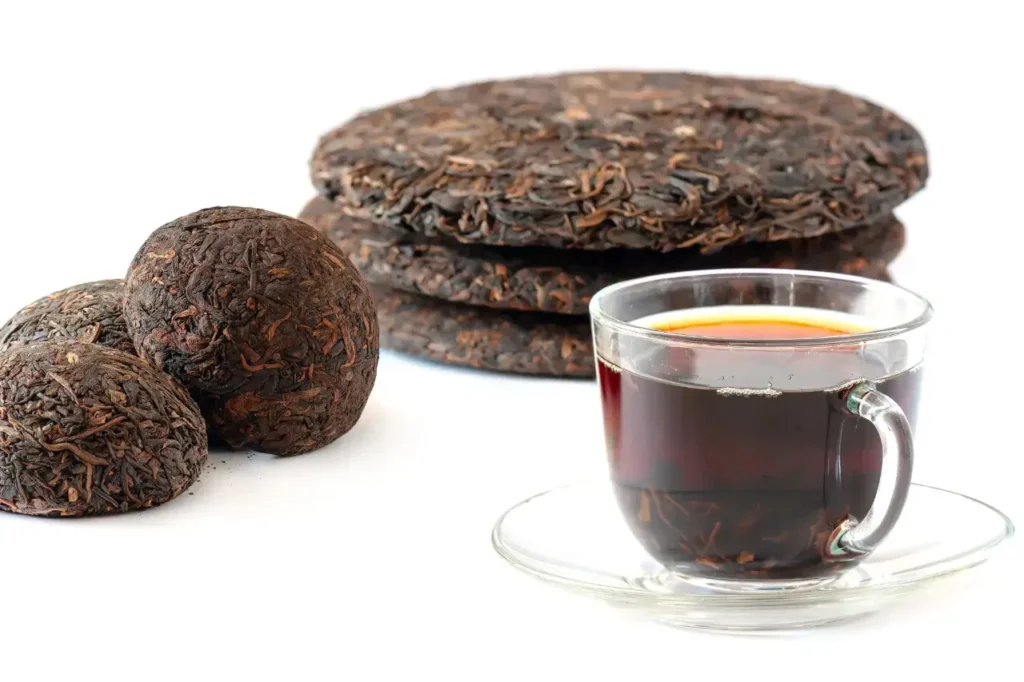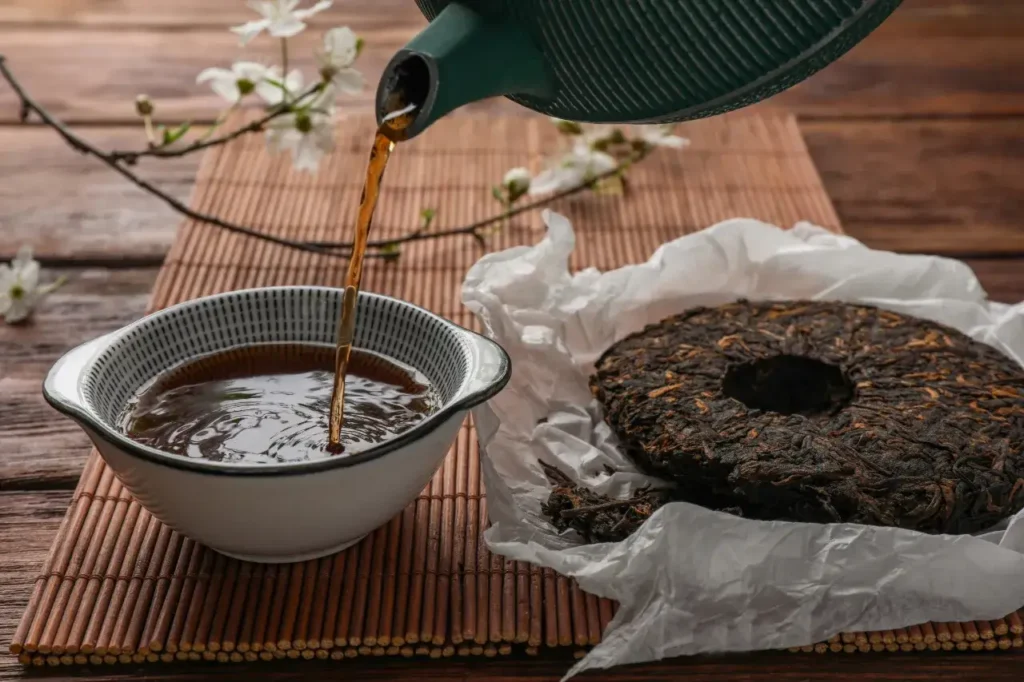Table of Contents
Introduction
Pu-erh tea, a traditional fermented tea from China, has been valued for centuries for its unique flavor and numerous health benefits. Whether you’re a tea enthusiast or someone looking for natural wellness options, good pu erh tea can be a fantastic choice to explore. This article will dive into the benefits, especially for weight loss, potential side effects, and how to find a high-quality pu erh tea.
What is Good Pu Erh Tea?
Good pu erh tea is crafted through a unique process of fermentation and aging. Originating from Yunnan Province in China, pu-erh is a post-fermented tea, meaning it undergoes a microbial fermentation process after the tea leaves are dried and rolled. This aging process, which can span years, gives pu erh tea its distinct taste, aroma, and health-boosting properties.
Pu-erh tea has two main types:
- Sheng Pu-erh (Raw) – This is the traditional version, aged naturally over time.
- Shou Pu-erh (Ripe) – This is produced with accelerated fermentation, making it darker and richer in flavor.
Pu-Erh Tea Benefits
1. Supports Weight Loss
Good pu erh tea has gained popularity for its potential role in weight loss. It contains natural compounds that may aid in:
- Fat breakdown: Studies suggest pu erh tea enhances the body’s ability to break down fat, reducing body fat over time.
- Metabolism boost: The caffeine and antioxidants in pu erh tea increase energy expenditure, which supports weight loss.
- Suppressing fat storage: Some research indicates that drinking pu erh tea may suppress the body’s tendency to store fat, making it a helpful addition to a weight-loss regimen.
If you’re looking for good pu erh tea for weight loss, consider choosing a quality product from a reputable source. Many fitness enthusiasts enjoy drinking pu erh tea before workouts to take advantage of its metabolism-boosting properties.
2. Promotes Heart Health
Regular consumption of pu erh tea may support cardiovascular health by lowering LDL cholesterol levels, reducing blood pressure, and promoting overall heart health. It’s rich in catechins and other antioxidants that help fight inflammation, one of the underlying causes of heart disease.
3. Aids in Digestion
Good pu erh tea can soothe the digestive system, making it an ideal after-meal beverage. It contains microbial enzymes from the fermentation process that improve digestion and reduce bloating. People who suffer from frequent indigestion may find relief with a cup of pu erh tea after meals.
4. Boosts Energy and Focus
The caffeine content in pu erh tea is moderate, offering a gentle energy boost without the jittery side effects often associated with coffee. Pu-erh is ideal for those looking for a focused, sustained boost in alertness. Additionally, pu erh tea contains L-theanine, an amino acid that promotes relaxation and focus, enhancing its mental benefits.
5. Supports Immune System Health
Good pu erh tea is packed with antioxidants and vitamins, strengthening the immune system. The fermentation process generates microbial compounds that have shown promising effects in enhancing immune response. With regular consumption, pu erh tea can help protect against common colds and flu.
6. Detoxifies the Body
Traditionally, pu erh tea is known for its detoxifying properties. The microbial activity within pu erh tea promotes the elimination of toxins, supporting liver function and helping the body cleanse itself naturally. Many people use it as a gentle detox tea.
7. Improves Skin Health
The antioxidants and anti-inflammatory compounds in pu erh tea are great for skin health. They help fight free radicals, which contribute to skin aging and other skin conditions. Drinking pu erh tea may contribute to a clearer, more youthful complexion over time.
How to Choose Good Pu Erh Tea for Weight Loss and Wellness

Not all pu erh teas are created equal, and quality can vary widely. Here are some tips to ensure you’re buying a good pu erh tea:
- Look for aged pu erh tea: Authentic aged pu erh tends to have a better flavor and more beneficial microbial compounds.
- Check the source: Authentic pu erh tea should come from Yunnan, China. The specific origin is crucial as it affects the quality.
- Beware of additives: A quality pu erh tea should contain no added sugars, flavors, or fillers.
- Smell and taste: Good pu erh tea has a unique earthy aroma. Avoid teas that smell stale or overly bitter, as this could indicate poor quality.
Potential Pu-erh Tea Side Effects
While pu erh tea is generally safe, it’s important to be aware of potential side effects, especially if consumed in large amounts.
1. Digestive Upset
For some people, drinking too much pu erh tea may cause an upset stomach, especially if they’re new to fermented foods or teas. Starting with a small amount can help the body adjust to the fermentation compounds.
2. Increased Heart Rate
The caffeine content in pu erh tea can cause increased heart rate or anxiety in some individuals, especially if consumed in large quantities. If you’re sensitive to caffeine, consider limiting your pu erh intake or opting for a naturally decaffeinated version.
3. Sleep Disturbances
Drinking pu erh tea in the evening could interfere with sleep due to its caffeine content. For restful sleep, it’s best to enjoy pu erh tea earlier in the day.
4. Iron Absorption Inhibition
Like many teas, pu erh can inhibit the body’s absorption of iron from food, which can be problematic for people with low iron levels. Consuming pu erh tea between meals rather than with meals can help reduce this effect.
5. Allergic Reactions
In rare cases, people might experience an allergic reaction to the fermentation compounds in pu erh tea. If you notice any unusual symptoms, it’s best to consult a healthcare provider before continuing to consume it.
How to Enjoy Pu Erh Tea

To experience the full benefits of good pu erh tea, consider preparing it traditionally:
- Use loose leaves: Loose leaf pu erh tea tends to have higher quality and flavor.
- Rinse the tea: Pu erh tea is often rinsed with hot water to remove any dust or impurities.
- Steep time: For a milder taste, steep pu erh for 2-3 minutes. Longer steep times will produce a stronger, more robust flavor.
Enjoying pu erh tea regularly can provide an array of benefits, but remember that quality matters. Investing in a good pu erh tea can enhance both the flavor and the health benefits you experience.
Frequently Asked Questions (FAQs) About Good Pu Erh Tea
Q1. Can I drink pu erh tea every day?
Yes, drinking pu erh tea daily can be beneficial, but it’s best to limit your intake to 2-3 cups per day to avoid caffeine-related side effects.
Q2. Is pu erh tea safe during pregnancy?
Due to its caffeine content, it’s wise to consult a healthcare provider before drinking pu erh tea if you’re pregnant or breastfeeding.
Q3. How much pu erh tea should I drink for weight loss?
Drinking 1-2 cups of good pu erh tea daily, preferably before meals, may support weight loss when combined with a healthy diet and regular exercise.
Q4. Does pu erh tea have calories?
Pu erh tea is naturally calorie-free, making it an ideal beverage for those seeking to lose weight or maintain their weight.
Q5. Can I add milk or sugar to pu erh tea?
While adding milk or sugar is possible, it’s not traditional and may alter the flavor. Pure pu erh is usually enjoyed without any additions.
Conclusion
Good pu erh tea is not only a delightful beverage but also a powerful health ally. From promoting weight loss and heart health to aiding digestion and detoxifying the body, pu erh tea offers a range of benefits that make it a worthy addition to your daily routine. However, as with any health supplement, moderation is key, and it’s important to be aware of potential side effects. When you choose high-quality, authentic pu erh tea, you’re embracing a tea tradition with remarkable wellness potential.













